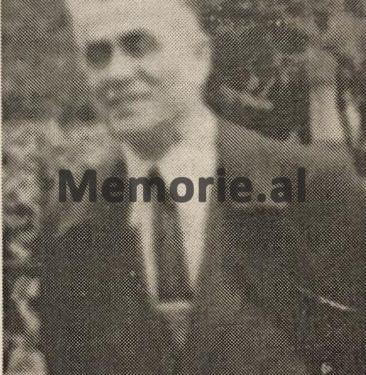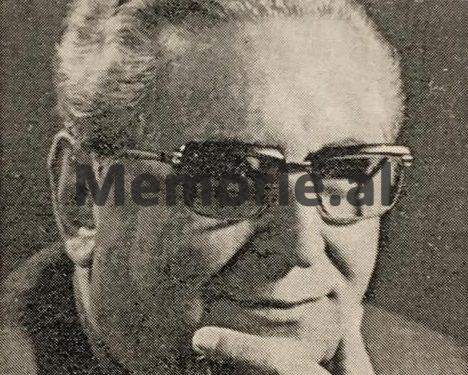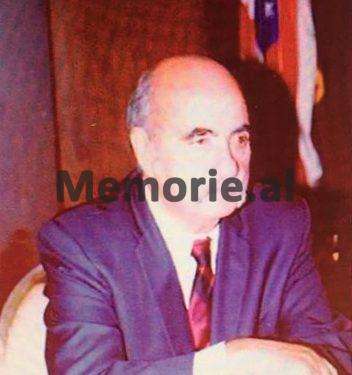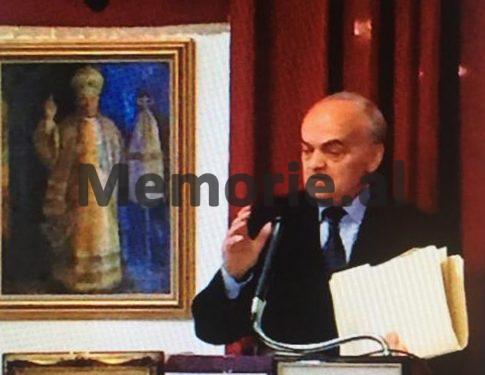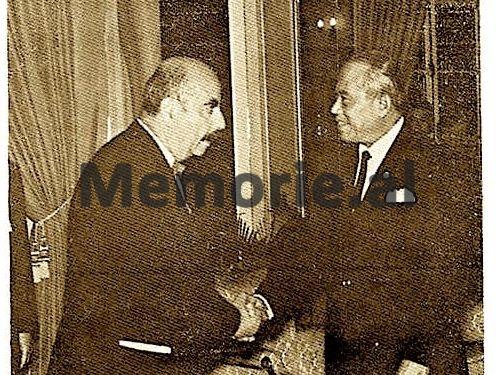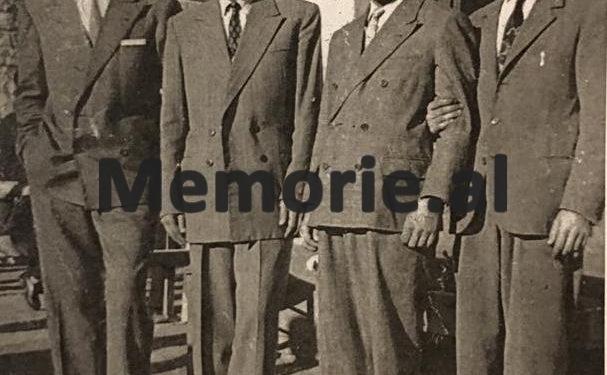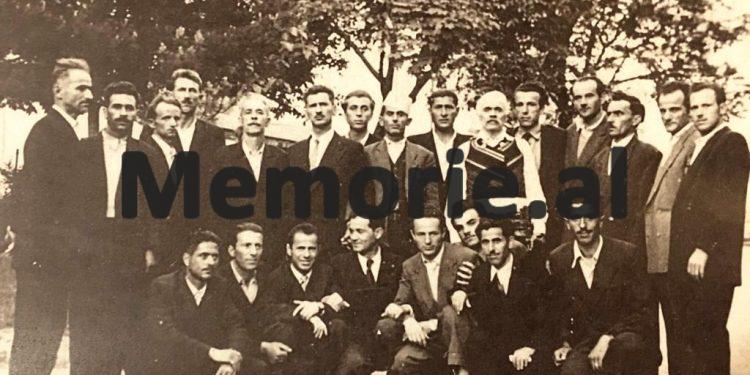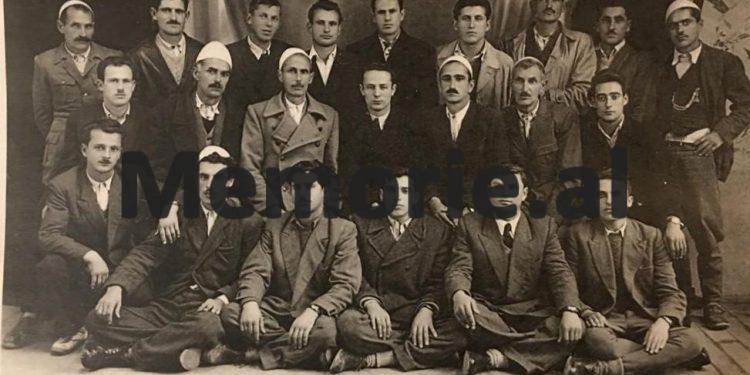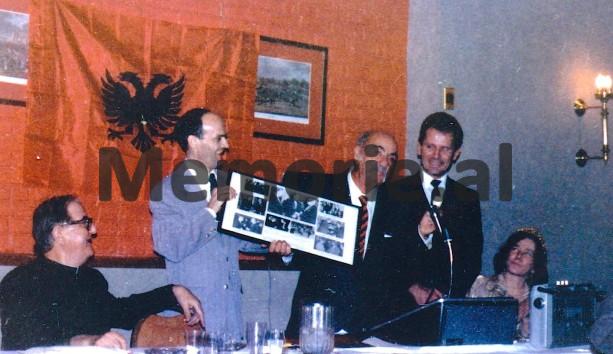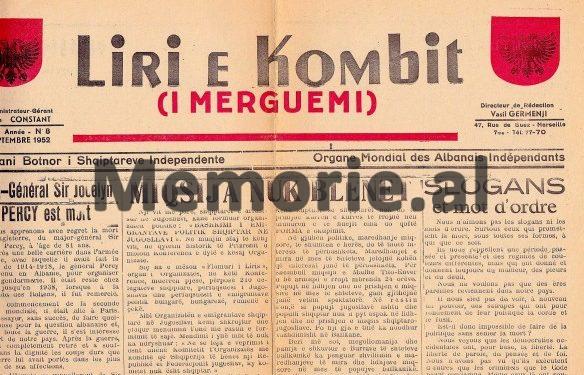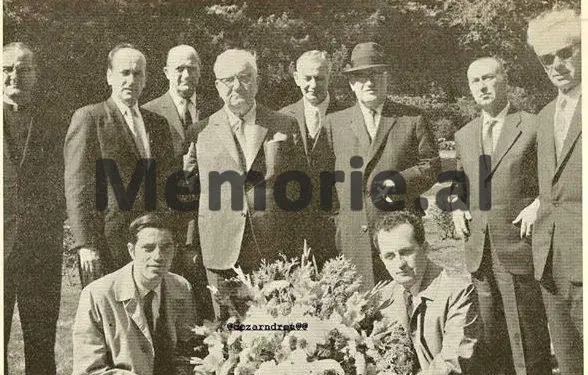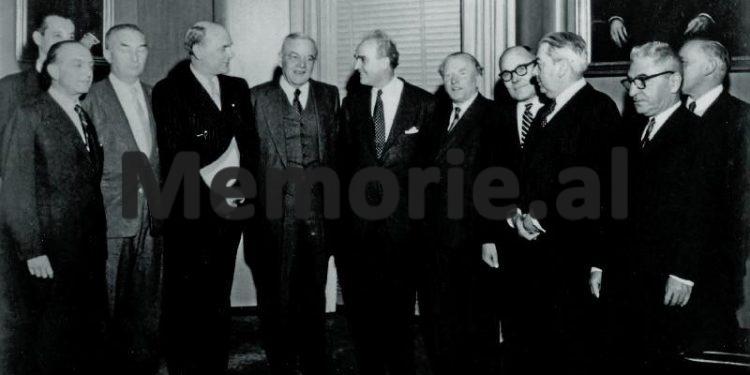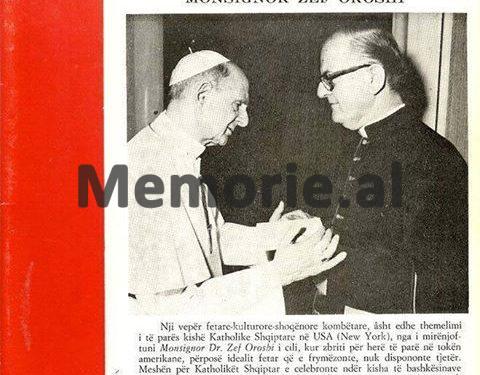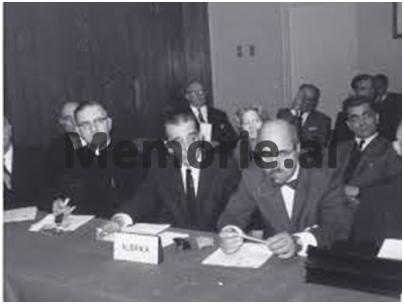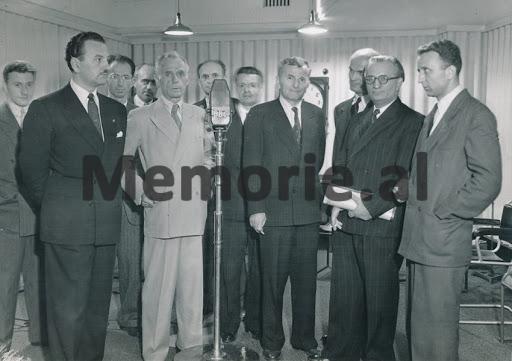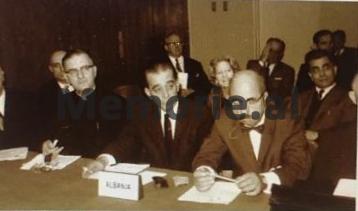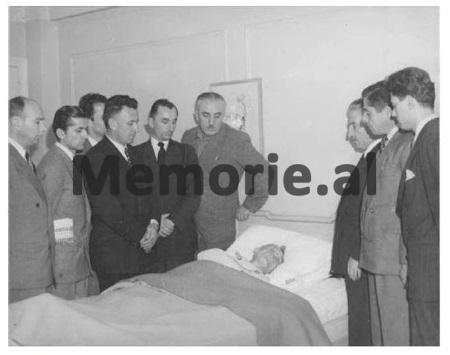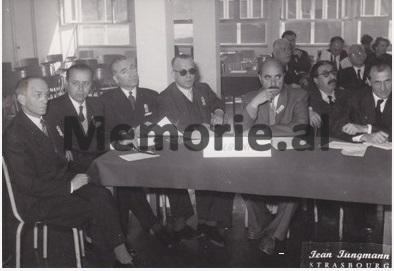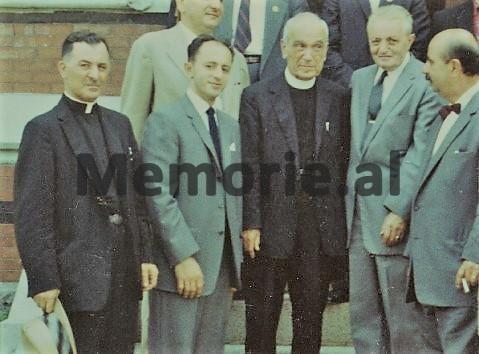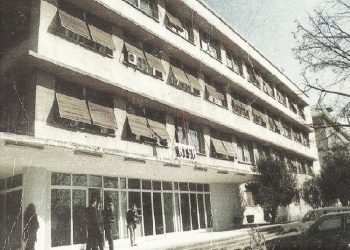Dashnor Kaloçi
Memorie.al publishes the unknown story of four famous Albanians of the political diaspora: two brothers Rexhep and Abdurrahim Kumbarçe, originally from Dibra e Madhe, Professor Mehmet Beqiri, originally from Vlora and Ing. Vasil Gërmenji from Kolonja, who were forced to leave Albania after the establishment of the communist regime of Enver Hoxha, living and working in a foreign country, where they passed away, without having the opportunity to return to their homeland one day. The rare testimony of Pjetër Kadeli who escaped from Albania in the first years after the war, for the two Kumbarçe brothers, whom he met in the camps of the former Yugoslavia and then in various Western countries, such as Italy, Belgium, etc. , where they made a major contribution to helping their compatriots who were in the camps of political asylum seekers, etc., by providing them with financial assistance. As described by the magazine “Koha Jonë” published in France by two political immigrants, Lec Shllaku and Isa Ndreu, the unknown story of two famous anti-communist intellectuals, Mehmet Beqiraj, originally from Vlora, who served as a professor at several Western universities. and Ing, Vasil Gërmenji, (grandson of Themistokli Gërmenji) originally from Cologne, who was a member of the “Free Albania” Committee in the United States and chairman of the Albanian section of the Congress of Captive Nations of Europe, wherein 1969, submitted to the US Congress a memorandum regarding the miserable situation of the Albanian people under the communist regime of Enver Hoxha.
Beqiraj, first as a student and later as a teacher and as a full professor at the well-known American Canadian, German, Lebanese and Syriac universities, left valuable traces everywhere. It should be noted that Prof. Mehmet Beqiraj did his first academic studies in Austria in the field of Agriculture and Agriculture and only in exile did he study Sociology, becoming in the last 20 years a professor of this science at various universities. He completed primary school in his hometown, Vlora, and completed his secondary education in Bodenkultur (Agriculture and Agriculture) in Vienna, Austria in 1941.
Immediately after the end of the war and the coming to power of Enver Hoxha’s communists, in addition to many of their political opponents who had joined the nationalist organization Balli Kombëtar or the Legality Movement Party, many well-known intellectuals who had graduated also left Albania. in the well-known Western universities, who were forced to take the long and painful road of emigration, to escape their revenge. Among those immigrants who lived for years in and abroad, where they engaged in research and scientific work, or by making a valuable contribution to the benefit of the Albanian cause, working and fighting to make known to the governments of Western countries what was happening in their homeland by the communist regime of Enver Hoxha, etc., were also two brothers, Rexhep and Abdurrahim Kumbarçe from Dibra e Madhe, Professor Mehmet Beqiraj from Vlora and Ing. Vasil Gërmenji from Kolonja, the grandson of the great patriot, Themistokli Gërmenji. All four of these Albanians, known as nationalists and with anti-communist convictions, as well as most of the Albanian political diaspora, died there in foreign lands, not having the opportunity to return to their homeland, Albania, which they devoted their whole lives.
The Kumbarçe brothers
The two brothers, Rexhep and Abdurrahim Kumbarçe, were born in the town of Dibra e Madhe, where their family originated. Throughout the period they both emigrated to Belgium and the United States, they became known for their humane activity and numerous charitable deeds. One of the people who knew him closely is Pjetër Kadeli, (originally from Mirdita), who fled Albania in 1949 due to persecution by the communist regime of Enver Hoxha and returned to Albania a few years later. the collapse of the communist regime. Regarding the past of Rexhepi and his brother Abdurrahimi, their friend Pjetër Kadeli testified: of the Albanian issue. But my words about Rexhepi alone would be incomplete if I did not mention his brother, Abdurrahimi. I felt lucky to know the late Abdurrahim Kumbarçe in 1951 when the so-called emigration organization was formed in the city of Prizren and since then we have remained inseparable friends. While we were serving a sentence in the Gerova prison in the former Yugoslav Republic of Croatia, which Serbs preferred to call a camp, Abdurrahimi, through his brother Rexhepi, informed me that he was being held in that camp. There we were surrounded by barbed wire and terrorized by Serb soldiers armed to the teeth with automatic and machine guns in all four corners of the siege of that prison. In that camp where we were more than 1700 Albanians, there were also from other countries, mainly of the communist countries of Eastern Europe. There we were given only 300 grams of bread in 24 hours and the conditions were extremely difficult. Based on this fact and seeing the extremely miserable situation for all the internees we were there, the two Kumbarçe brothers, Rexhepi and Abdurrahimi, did everything possible to alleviate the suffering of their comrades, helping all immigrants, both economically and morally. They split tobacco cigarettes in two and gave them to other inmates who had no help from their families. This did not last long, because the UDB agents who were infiltrated there, informed their bosses and since that day, the camp command selected 100 Albanians and sent us to Italy. After that, the two Kumbarche brothers were tortured in the most barbaric way by UDB agents, walking through the frightening basements of that camp, so much so that when they got out of there, neither brother could recognize the other brother. This continued for 18 months and then, along with several other Albanians, they were taken from there and given political asylum, taking them to Belgium. In that place, they immediately began to engage and began working living as honest Albanians. After staying in the Belgian capital for some time, as Rexhepi was fluent in French, he went to the Belgian Ministry of Foreign Affairs and prepared immigration documents for all the children of immigrants living in Belgium. After that, the Belgian government was forced to send thousands of dollars to Albania to help the children of those immigrants who were in the forced labor camps of the communist regime in Tirana. I don’t know if all those dollars arrived at the destination, but I wanted to tell you about the high humanism of the two brothers, Rexhep and Abdurrahim Kumbarçe, who were the angriest people I have ever known in my life. In addition, they both helped with cash and other Albanian immigrants living at the time in the Udine and Brindisi camps in Italy, where the authorities of those camps abused the aid and food provided by Western European countries. The two Kumbarçe brothers also sent money to their sister, who was in Dibra e Madhe for all religious holidays, especially during the months of Ramadan and Eid al-Fitr, so that she could distribute the money to them. the Fukarees to celebrate that holiday as well “, Pjetër Kadeli recalled, regarding the humane activity of the two Kumbarçe brothers, in the Gerovo camp in Croatia and in Brussels, Belgium.
From Belgium to the USA
After nearly ten years in Belgium, in 1961, the two brothers, Rexhepi and Abdurrahimi, emigrated to the United States, where they were immediately stabilized. Regarding their stay in the United States and their humanitarian activity, Pjetër Kadeli testified: “As soon as they came to the United States, Rexhepi and Abdurrahimi immediately went to work, working up to 60 and 80 hours a week. Although they had a very sufficient income, the life they lived was very simple and they set to work helping the various religious entities frequented by Albanians. They also collected donations and contributed to the construction of a large mosque in the city of Dibra e Madhe, which cost them about $ 40,000. Throughout their stay in the United States, they helped with large sums of money and many different cultural and sports entities, as well as poor people who died in various accidents and there was no one to pay for their funeral expenses… In the mid-1960s, the two brothers, Rexhepi and Abdurrahimi, prepared the documents and asked to go to their hometown, Debar e Madhe, in the former Yugoslavia, in order to get along with the relatives of the family they had. time without seeing them. But as soon as they arrived in Velika Debar, within 24 hours, Serbian authorities ordered them to leave Yugoslavia immediately. The reason for their departure and the announcement of “persona non grata” was the fact that in 1951, on the occasion of our National Independence Day, they had raised the flag without a star in the Gerova camp. Not only me but all the Albanian diaspora who have lived in the US, have seen and appreciated the humane activity of the two Kumbarçe brothers, distinguished for their high virtues and faith and generosity “, recalled Pjetër Kadeli, regarding two the Kumbarçe brothers. After nearly 28 years of intense human activity in the United States, the two Kumbarche brothers passed away. The first to die was Rexhepi, who died of a heart attack on November 1, 1987, leaving his wife Naxhije and his son Hekurani in great grief. He was buried with great honors by hundreds of Albanians from the anti-communist diaspora and other friends of America. After some time, Abdurrahimi also passed away.
Who was Prof. Mehmet Beqiraj?
Regarding the death of Prof. Mehmet Beqiraj, in 1987, the Albanian press of the anti-communist diaspora, wrote, among other things: “After a long illness, died in Kingston (Ontario) Canada, on June 3, 1987, the well-known Professor Mehmet A. Beqiraj University 75 years old. He leaves behind his wife, the noble lady Edith, in Beichl, and a son. Prof. M. Beqiraj is known in the Albanian political and cultural circles for the many services he gave to the Arber world. He was the initiator and inspirer of several national meetings in the homeland and a respected adviser to high-ranking political offices in exile. He took an active part in the Albanian Uprising in the ranks of the “Balli Kombëtar” Organization, leaning completely in exile with the faction led by Mr. Hasan Dosti. After voluntarily obtaining American citizenship, he completely withdrew from political activism, devoting himself only to university studies. At first as a student and later as a teacher and as a full professor at the well-known American, Canadian, German, Lebanese, and Syriac American universities, leaving valuable traces everywhere. It should be noted that Prof. Mehmet Beqiraj, made his first academic studies in Austria in the field of Agriculture and Agriculture, and only in exile, he devoted himself to the study of Sociology, becoming in the last 20 years a professor of this science in various universities. He completed primary school in his hometown, Vlora, and high school in Bodenkultur (Agriculture and Agriculture), graduating in Vienna, Austria in 1941. He was immediately appointed a teacher at the Kavaja Agricultural School, where he worked for a year from where he went to Vlora where he becomes chairman of the Agricultural Office of the province. The end of the Second World War finds Prof. Beqiraj in Austria, and later in the refugee camps in Italy. In 1948, he was appointed a teacher at the University of Damascus (Syri) at the Agri-Culture School, where he served for almost two years. In 1949 he emigrated to America and began working in a chemical-agricultural laboratory in Philadelphia, USA. At the same time, he collaborates with the editorial office of Radio Free Europe. In 1959 he embarked on the long journey of academic studies at the famous Cornell University, Ithaca, N.Y., where he first received his Master’s Degree in 1960 and in 1962 received his Ph.D. D. (doctorate) presenting a thesis on sociological studies. In 1963, he was appointed a professor at American University in Beyrouth (Lebanon), and in 1964, he continued his research at Cornell University. In 1966 he was appointed visiting professor at the University of Bonn in West Germany. In 1967 he was appointed professor of sociology at the University of Alberta in Edmonton (Canada) and from 1969 until his retirement in 1977, he was a professor at Queens University in Kingston (Ontario) Canada. His manuscripts are numerous, which were texts of university courses where he taught and we are mentioning only a few titles: “Agriculture in Sociology”, “Sociological Modernization”, “History of Sociological Thought”, “Sociological Changes” etc. Also unpublished are two Albanian-themed manuscripts, such as “Sociological Development in Albania” and “Albanian Uprising 1943-1944”. Most of the manuscripts are written in English, but some are also in German, a language he knew very well, and some here and there in Albanian. Their publication would shed some light on the Albanian Uprising. We add that Prof. Beqiraj, I also collaborate in the book published by the “Free Europe” Committee in 1956 entitled “Albania” where I also collaborate with my compatriot Mr. Avv. Kemal Vokopola and George Bossy and Fred Pisky. The editor-in-chief of that book was Prof. Stavro Skëndi. That book is a good chronological anthology of Albanian historical and political events until 1956. It also contains important biographical sketches of the political class in Albania from 1944 to 1956. He also collaborated in the famous Koliqi magazine “Shejza” in the newspaper. of the Committee “Free Albania”, “Free Albanian”, concludes the article of the magazine “Our Time”, published in Florence by Lec Shllaku and Isa Ndreu, regarding the life and death of the prominent Albanian professor, Mehmet Beqiraj.
Who was Vasil Gërmenji?
On November 28, 1988, the day of the National Day of Albania, in the entire Albanian diaspora living in the USA, the news of the accidental death of Ing. Vasil Gërmenji, (grandson of the great patriot, Themistokli Gërmenji), one of the most prominent personalities of the anti-communist diaspora. The death of Ing. At that time, Vasil Gërmenji was followed by almost the entire Albanian anti-communist Albanian press in the West, especially by the magazine “Koha e Jonë” by Isa Ndreu and Lec Shllaku, which was published in Florence, Italy and distributed in all places where there were Albanian communities. That magazine, after the big headline, “Albanian patriot dies in a car accident” wrote: “This is the headline of the news of the tragic death of Ing. Vasil Germain and his faithful wife, Germany, from the French city of Marseilles, with whom he lived for ten years in the city of Inverness in central Florida. The accident happened exactly on Flag Day, November 28, 1988. The newspaper in question gives a brief description of Gërmenji’s political activity as a member of the “Free Albania” Committee, especially in relation to the Assembly of Robbeneme Nations of Europe. , brought a photograph in front of the magnificent US Congress building in Washington, D.C., when Germain handed over to New York Congressman Horton a political memorandum on the current state of the Robneme Nations, addressed to the US Congress by the European Assembly ACEN in 1969 when Gërmenji was Chairman of the organization in question. For more than ten years, Gërmenji, despite his wife, has spent his old age in the wooded province of beautiful central Florida with a mild and pleasant climate. They lived almost alone and very close to them lived the family of the well-known journalist, Shemsedin Vëndresha. Like others of this age, Gërmenji had left villas to be built according to their wishes, followed by a small pool, as the comfort of modern American civilization allows. This peaceful life ended tragically for both and on December 5 at the modern-day mourning house in Inverness, a simple funeral ceremony was held according to the rite of the Orthodox Church and in the presence of some 30 people, friends of the Germans, including some Albanians coming from nearby countries. Dr. Hamdi Oruçi, the Albanian doctor and friend of the Gërmenji family who had come from New York, led the funeral ceremony. After a short speech in English on the life of Mr. Gërmenji and his wife, he gave the floor to Mr. Rexhep Krasniqi, a close associate of Gërmenji for many years, who conducted a summary biographical analysis in English of their lives. The burial took place in a very dignified manner, in the beautiful cemetery of the city of Inverness, where our compatriot, Mr. Adem Hodo, expressed his last farewell in the Albanian language. Thus, far from the beloved homeland and far from the Albanian centers in America, Vasil and Germain Gërmenji, found permanent peace and tranquility in the benevolent land of America./Memorie.al




